Related Research Articles

The Bibliothèque nationale de France is the national library of France, located in Paris on two main sites known respectively as Richelieu and François-Mitterrand. It is the national repository of all that is published in France. Some of its extensive collections, including books and manuscripts but also precious objects and artworks, are on display at the BnF Museum on the Richelieu site.
Didot is the name of a family of French printers, punch-cutters and publishers. Through its achievements and advancements in printing, publishing and typography, the family has lent its name to typographic measurements developed by François-Ambroise Didot and the Didot typeface developed by Firmin Didot. The Didot company of France was ultimately incorporated into the modern CPI printing group.

Jean-Pierre Falret was a French psychiatrist. He was born and died in Marcilhac-sur-Célé.

Honoré Théodore Paul Joseph d'Albert, 8th Duke of Luynes was a wealthy French nobleman and scholar. He is most remembered for the collection of exhibits he gave to the Cabinet des Médailles in 1862, and for supporting the exiled Comte de Chambord's claim to the throne of France. Throughout his life, D'Albert inherited a number of French titles, including Duke of Luynes, de Chevreuse, and de Chaulnes.
The Société des Antiquaires de France is a Parisian historical and archaeological society, founded in 1804 under the name of the Académie celtique. It is now based at the Louvre, in the pavillon Mollien.
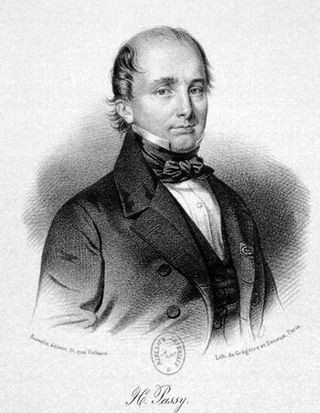
Hippolyte Philibert Passy was a French cavalry officer, economist and politician.

Antoine Vérard was a late 15th-century and early 16th-century French publisher, bookmaker and bookseller.
Natalis de Wailly was a French archivist, librarian and historian.
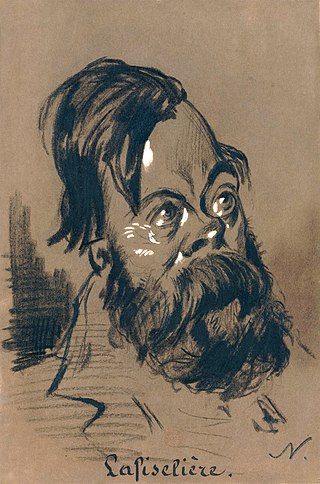
Albert-André Patin de La Fizelière, also known by his pen name Ludovic de Marsay, was a French littérateur, writer on electoral and constitutional law, art critic, and historian, known for his friendship with Champfleury and for his ties to the Café Guerbois circle. He was described by Edmond Antoine Poinsot as one "of the small number of our learned men who are both spiritual and without pedantry". He was a friend of Baudelaire and published the first bibliography of the latter a year after his death.
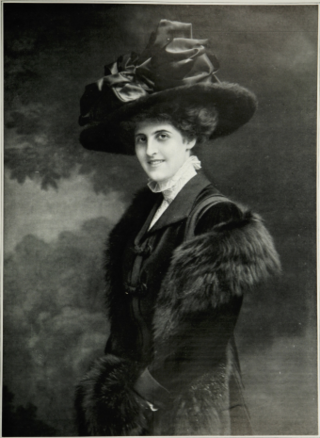
The Fould family is a family of French Jewish descent known for success in banking. It was founded by Beer Léon Fould, a wine-dealer's son from Lorraine, who moved to Paris in 1784 to establish a banking business. The name comes from the Hessian city of Fulda.

Antoine-Augustin Renouard was an industrialist and political activist in Paris at the time of the French Revolution who became a book dealer, printer and bibliographer.
Jules-Léopold Renouard was a stock broker, financier and banker from Paris.
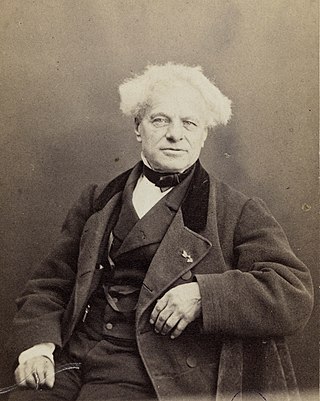
Auguste-Michel-Benoît Gaudichot pseudonym: Michel Masson was a French playwright, journalist and novelist of the 19th century.

Gilles de Gourmont, Egidius Gormontius in Latin, was a Parisian bookseller and printer active in Paris between 1499 and 1533.

Jules-Joseph Guiffrey was a 19th-century French art historian, a member of the Académie des beaux-arts.
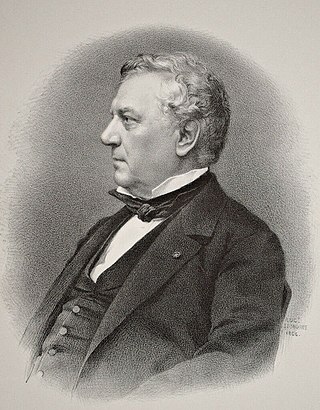
Augustin Charles Renouard was a French lawyer and politician. During a long career he worked as an advocate, was a member of the chamber of deputies, was vice-president of Société d'économie politique, sat on the Court of Cassation and was a Senator. He published many books and articles, and was elected a member of the Académie des Sciences Morales et Politiques of the Institut de France. He made important contributions to the law on copyright, which he saw as a temporary monopoly granted to the author rather than a right of ownership.

Symphorien Casimir Joseph Edouard Boitelle was a French soldier, administrator, chief of the Paris police, deputy and senator.

Césaire Léon Amaudric du Chaffaut was a French politician who was a member of the National Assembly and then a Senator from 1876 until his death.
Mustapha ibn Muhieddine, known as Emir Mustapha, Sidi Moustafa, Moustafa El Hassani El Djazairi, was an Algerian religious and military leader who led a struggle against the French colonial invasion in the mid-19th century with his brother, Emir Abdelkader.

Jean-Joseph Bonaventure Laurens was regarded by some as a "universal spirit", as attested not only by his paintings, watercolours and lithographs, but also by his vocation as a musician, archeologist, geologist and theorist.
References
- 1 2 3 "Jules Renouard (1798-1854)". Bibliothèque nationale de France. Retrieved 10 February 2016.
- ↑ "Revue Littéraire: Tableau d'Histoire universelle...chez Jules Renouard, libraire, 6, rue de Tournon". Journal des demoiselles, Volume 11, Issue 5. May 1843. p. 134.
- 1 2 Alain Garric (compiler). "Jules Renouard, Imprimeur, Éditeur, Libraire". A. Garric & Geneanet. Retrieved 10 February 2016.
- ↑ "Progrès de la contrefaçon, dénonciation et protestation". Association des amis de la Bibliothèque nationale de France (Gallica). 21 May 1851. Retrieved 11 February 2016.